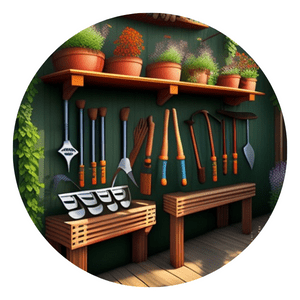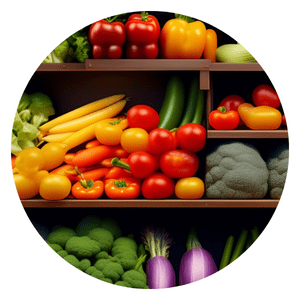What to Grow Together With Basil
Basil is a versatile and popular herb that has been used in cooking and medicine for centuries.
Its distinct aroma and flavor make it a staple in various cuisines around the world, adding a fresh and vibrant element to dishes.
However, did you know that basil can also have positive effects on other plants when grown together?
In this article, we will explore some of the best companion plants to grow alongside basil, enhancing not only its growth but also benefiting your garden as a whole.
Whether you are an experienced gardener or just starting out, discovering which plants thrive in the presence of basil can elevate your gardening experience to new heights.
So let’s dive into the world of companion planting with basil and unlock the secrets behind creating a harmonious garden ecosystem.
Basil Companion Planting Menu
Tomatoes
Planting basil near tomatoes has proven to be beneficial for both plants.
Not only do they enhance each other’s flavors when used together in cooking, but they also have a positive effect on each other’s growth.
Basil emits natural compounds that repel pests like aphids, mosquitoes, and flies, which helps protect the nearby tomato plants from these unwanted visitors.
Similarly, tomatoes emit chemicals that can deter certain pests that may harm basil. This natural pest control allows both plants to thrive without the need for harmful pesticides.
Moreover, planting basil alongside tomatoes can improve the overall health of the garden ecosystem.
Basil attracts beneficial insects like bees and butterflies with its fragrant flowers, which aid in pollination and promote biodiversity.
Additionally, some studies suggest that the aroma of basil may even enhance the flavor of tomatoes as it is said to mimic some of their own aromatic compounds.
In conclusion, cultivating basil near tomatoes not only creates a harmonious combination in cooking but also provides mutual benefits in terms of flavor enhancement and pest control.
The companionship between these two plants fosters a healthier garden environment while reducing reliance on synthetic pesticides and promoting natural pollination processes.
So why not take advantage of this companionship by planting them together in your garden?
Peppers
Another plant that pairs well with basil is peppers.
Basil is believed to enhance the flavor of peppers when grown together, making them tastier and more aromatic.
The close proximity of the two plants allows for cross-pollination and exchange of beneficial compounds, resulting in a more vibrant and flavorful harvest.
In addition to flavor enhancement, growing basil alongside peppers can also help deter common pests such as aphids and spider mites. These pests can be detrimental to pepper plants, causing damage to leaves and inhibiting growth.
However, the strong aroma emitted by basil acts as a natural repellent for these pests, keeping them at bay and protecting the pepper plants from infestation.
Overall, planting basil alongside peppers not only improves their taste but also provides natural pest control benefits.
This mutually beneficial relationship between the two plants creates a harmonious garden environment where both thrive and contribute positively to each other’s growth.
Eggplants
Eggplants and basil make an excellent combination in the garden for several reasons.
Firstly, basil’s strong aroma is known to repel a variety of pests that commonly affect eggplants, such as aphids, mites, and tomato hornworms.
By planting these two together, you create a natural barrier that helps protect your eggplants from these destructive insects.
Furthermore, basil can also attract beneficial insects like bees and predatory wasps.
Bees are essential for pollinating eggplant flowers and ensuring a good fruit set, while predatory wasps feed on the eggs of harmful pests like aphids and mites. This symbiotic relationship benefits both plants by promoting pollination and reducing pest populations naturally.
In addition to its pest-repellent properties, growing basil alongside eggplants can enhance their flavor when used in cooking.
The aromatic oils released by the basil plant can infuse into the neighboring eggplant leaves and fruit, resulting in a more flavorful harvest. This culinary advantage makes planting these two companions even more rewarding for gardeners who enjoy using fresh herbs in their dishes.
Overall, the pairing of basil with eggplants not only deters common pests but also promotes pollination and enhances flavor.
With these advantages in mind, it’s clear why many gardeners consider this combination an ideal match for a thriving vegetable garden.
Eggplants
Eggplants and basil make an excellent combination in the garden for several reasons.
Firstly, basil’s strong aroma is known to repel a variety of pests that commonly affect eggplants, such as aphids, mites, and tomato hornworms.
By planting these two together, you create a natural barrier that helps protect your eggplants from these destructive insects.
Furthermore, basil can also attract beneficial insects like bees and predatory wasps.
Bees are essential for pollinating eggplant flowers and ensuring a good fruit set, while predatory wasps feed on the eggs of harmful pests like aphids and mites. This symbiotic relationship benefits both plants by promoting pollination and reducing pest populations naturally.
In addition to its pest-repellent properties, growing basil alongside eggplants can enhance their flavor when used in cooking.
The aromatic oils released by the basil plant can infuse into the neighboring eggplant leaves and fruit, resulting in a more flavorful harvest. This culinary advantage makes planting these two companions even more rewarding for gardeners who enjoy using fresh herbs in their dishes.
Overall, the pairing of basil with eggplants not only deters common pests but also promotes pollination and enhances flavor.
With these advantages in mind, it’s clear why many gardeners consider this combination an ideal match for a thriving vegetable garden.
Beans
Another great plant to grow near basil is beans.
Basil can attract beneficial insects like bees and butterflies that help with pollination.
Planting basil near beans can attract these helpful pollinators and improve bean production.
Additionally, the strong aroma of basil plants can also help deter pests that may harm the beans, such as aphids or spider mites.
The relationship between basil and beans is a perfect example of companion planting.
By intercropping these two plants together, gardeners can take advantage of their natural symbiotic relationship to create a healthier and more productive garden.
The bees and butterflies attracted by the basil will not only assist in pollinating the bean flowers but also other nearby plants, leading to an overall increase in yield.
Furthermore, planting basil near beans can have additional benefits for the gardener as well.
Basil is known for its ability to repel certain insect pests due to its strong aroma, including mosquitoes, flies, and even some types of beetles.
By having a few rows of basil alongside your bean crop, you can naturally protect them from potential damage caused by these common garden pests without resorting to chemical pesticides.
Overall, growing basil near beans offers numerous advantages for both the plants themselves and the gardener tending to them.
From attracting beneficial insects for pollination to repelling unwanted pests naturally, this companion planting combination proves once again how nature has designed a harmonious way for different species to coexist and thrive together in the garden.
In the garden, where basil thrives, A symphony of taste arrives. Tomatoes, with their vibrant hues, Dance alongside, chasing the blues. Mint brings freshness to the air, While peppers add a hint of flair. Carrots grow strong, beneath the sun, Together we flourish, a feast begun.
Chappy The Gardener
Cucumbers
Basil, with its strong aroma and pest-repelling properties, is a versatile herb that can be paired with several vegetables for mutual benefits in the garden.
One such compatible plant is cucumbers. When grown together, basil acts as a natural pest deterrent and may help keep cucumber beetles at bay. These pests are common enemies of cucumber plants as they feed on the leaves and fruits, causing damage to the crop.
Furthermore, basil’s aromatic scent can also attract beneficial insects like bees and butterflies to the garden.
Bees play a crucial role in pollination, which is essential for cucumbers to develop properly.
By attracting pollinators with its fragrant flowers, basil indirectly contributes to higher cucumber yields.
In addition to their compatibility in terms of pest control and pollination benefits, basil and cucumbers also make great culinary companions.
The fresh flavors of both ingredients complement each other well in various dishes such as salads or chilled soups like gazpacho.
Growing these two plants together not only enhances the biodiversity of your garden but also offers you an opportunity to enjoy delicious homemade meals using homegrown ingredients.
Lettuce
Basil, a popular herb known for its distinct aroma and flavor, not only adds a delightful touch to various dishes but also has several benefits when grown alongside other plants.
One such plant that pairs well with basil is lettuce.
During the scorching hot summer months, basil can provide some much-needed shade to lettuce plants, helping them avoid bolting.
Bolting occurs when lettuce plants prematurely produce tall stalks and flowers due to excessive heat or stress, resulting in bitter-tasting leaves.
By planting basil nearby, the broad leaves of this herb create a natural canopy that shields the delicate lettuce from direct sunlight and helps regulate temperature.
Moreover, the combination of basil and lettuce offers an interesting mix of flavors in culinary endeavors.
Basil’s sweet yet peppery taste complements the mild and refreshing flavor of lettuce beautifully.
Whether it’s using both ingredients in salads or sandwiches or incorporating them into stir-fries or wraps, their contrasting flavors create a harmonious blend that adds depth and complexity to any dish.
Additionally, these two greens are often used together as toppings for pizzas or in pasta dishes to enhance their overall taste profile.
The aromatic presence of basil perfectly balances the crispness of lettuce leaves, resulting in a delightful gastronomic experience.
Growing basil alongside lettuce is not only beneficial for providing shade during hot summer months but also enhances the overall culinary experience by combining their unique flavors.
Herbs
Basil, with its aromatic and flavorful leaves, is not only a wonderful addition to countless dishes but also a great companion for other herbs in the garden.
When planted together with herbs like parsley, oregano, and thyme, basil can enhance their growth while also benefiting from their presence.
The leafy structure of parsley provides shade for basil during hot summer days, preventing it from wilting or developing sunburned leaves.
Moreover, planting basil next to oregano can help deter pests such as aphids and spider mites since oregano naturally repels these insects.
Additionally, both basil and oregano have similar soil moisture requirements, making them compatible companions in terms of watering needs.
Thyme is another herb that pairs well with basil due to its low-growing habit. When thyme is planted nearby the taller basil plants, it acts as a living mulch by covering the soil surface and suppressing weed growth.
Overall, growing basil alongside other herbs like parsley, oregano, and thyme not only creates an aesthetically pleasing herb garden or container but also allows for easy access to a variety of fresh flavors in your culinary adventures.
With this diverse mix of herbs thriving together harmoniously, you can create delicious herb-infused meals right at your fingertips all season long!
Flowers
Growing basil alongside flowers like marigolds, nasturtiums, or petunias is not only aesthetically pleasing but also serves as a natural pest deterrent.
These flowering plants act as a barrier and help repel common garden pests such as aphids, mosquitoes, and whiteflies. Their strong scent confuses and masks the aroma of the basil plant, making it less attractive to pests that might otherwise damage or eat the delicate leaves.
Moreover, interplanting basil with these colorful flowers can attract beneficial insects that aid in pollination and pest control.
Bees are particularly fond of marigolds and nasturtiums, while butterflies are attracted to petunias.
By drawing these beneficial creatures into your garden space, you create a more balanced ecosystem that helps promote healthy growth for all plants involved.
The combination of vibrant flowers and aromatic basil provides not only visual appeal but also an enticing fragrance in your garden.
The mix of scents can be invigorating for humans while adding another layer of complexity to the overall sensory experience.
Whether you choose to grow them in separate pots or directly in your garden beds, this interplanting technique allows you to enjoy both beautiful blooms and delicious culinary herbs simultaneously.
In conclusion, basil is a versatile herb that can be grown alongside a variety of other plants in your garden.
Whether you are looking to enhance the flavor of your tomato plants or repel pests from your vegetables, basil is a great companion.
It not only adds flavor and aroma to your dishes but also provides numerous health benefits.
Consider planting basil with tomatoes, peppers, or even strawberries for a bountiful and flavorful harvest.
So why wait?
Start planning your garden today and enjoy the benefits of growing basil alongside other compatible plants!
Click To Grow
Helps Us Grow – Share If You Like












